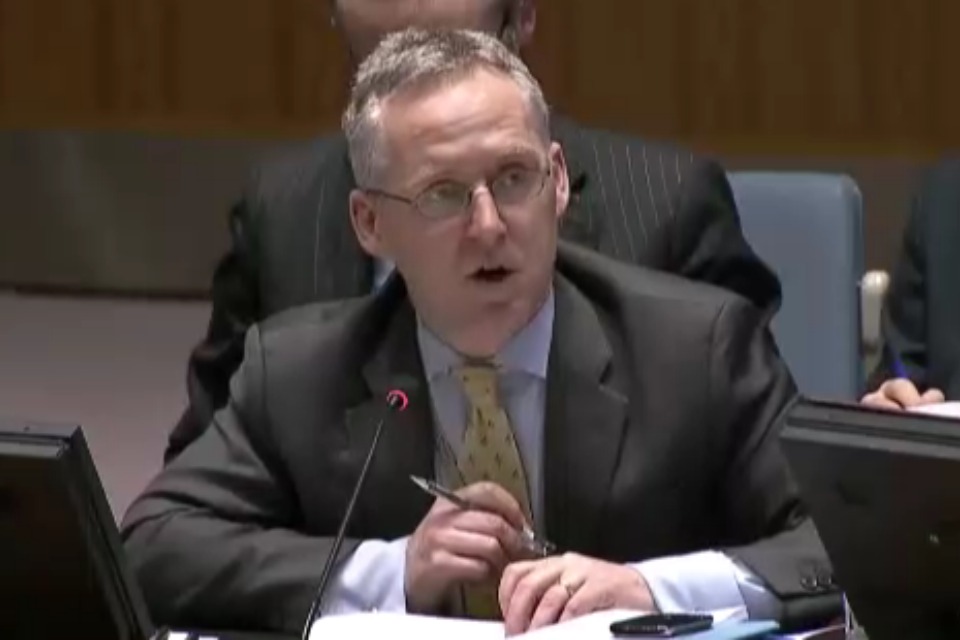"Kosovo’s independence is irreversible and we encourage those countries that have not yet recognised Kosovo to do so"
Statement by Michael Tatham of the UK Mission to the UN, to the Security Council Meeting on Kosovo

Mr President,
I thank the Secretary-General’s Special Representative for Kosovo, Mr Farid Zarif for his briefing today. I welcome Deputy Prime Ministers Dacic and Thaci to this Council again.
Since we last met in this format – only two months ago – we have witnessed welcome progress in Kosovo. The formation of a new government in Pristina in December after a long gap marks an important step forward following free and fair elections throughout the territory of Kosovo in June last year.
With the key institutions now in place, we look forward to the new government enacting the reforms highlighted in the EU Commission’s Annual Progress Report last year. There is much for the new administration to take forward, including economic development and rule of law, ensuring greater independence of the judiciary and tackling organised crime and corruption.
Mr President,
The formation of a new government is also a chance to bring renewed momentum to the EU-facilitated high-level dialogue. The governments of both Serbia and Kosovo have shown welcome commitment to this process and we wish them every success in their first meeting of 2015 next week. Continued progress at working level will be vital, and I’m pleased that the Secretary-General’s report notes that some progress has been made on the technical-level dialogue in December. The normalisation of relations between Kosovo and Serbia is integral to both countries’ European Union accession paths.
We also welcome the new government’s commitment to establish judicial proceedings for the investigation into the allegations reported by the Special Investigative Task Force. As the Secretary-General makes clear in his report, this will be an important step forward for the new government and we urge them to ensure that relevant laws are passed to enable this.
Mr President,
I joined the distinguished representative of Angola in commending the work of UNMIK, supported by UN Women and UNDP on Women, Peace and Security including the holding of an Open Day to mark the International Day for the Elimination of Violence against Women. We also welcome the adoption of the Kosovo Action Plan for implementing resolution 1325 of this Council. In this context, the legislative provision made for survivors of sexual violence during the Kosovo conflict is an important step. Women, Peace and Security and the Prevention of Sexual Violence are rightly important priorities of this Council and it is heartening to see these issues being addressed in Kosovo.
Mr President,
While the Secretary-General’s Report underlines the continuing stability of the overall security situation in Kosovo, the violence in Pristina during recent protests is a matter of concern. We all support the right to peaceful protest but government authorities and the opposition in Pristina must do all they can to avoid violence and escalation. It is vital that the government and international community in Kosovo continue to engage with the opposition to address the underlying causes of the protests, including the economic situation. The Secretary-General’s Report also prompts us to note the need for continued focus on tackling ethnically-motivated incidents. We urge all political and community leaders to work towards creating greater cooperation in and between communities; tackling issues from the past; and reconciliation.
Mr President,
Later this month we will mark the seventh anniversary of Kosovo’s declaration of independence. It is an important moment to reflect on the progress Kosovo has made. It is also a chance to recognise the progress made in the international community. Since 2008, well over half of the Member States in the United Nations have recognised Kosovo, including many of its neighbours in the Western Balkans. And thanks to the historic agreement reached with Serbia in 2013, Kosovo now has a strong foundation for co-operation with Belgrade and for negotiations on EU membership. In addition, Kosovo has secured access to IFI funding and will compete in the 2016 Olympics having gained membership of the International Olympic Committee. We welcome this progress. It demonstrates that Kosovo’s independence is irreversible and we encourage those countries that have not yet recognised Kosovo to do so.
Mr President,
Precisely because of this level of progress, the United Kingdom reiterates its view that it is past time to adjust the frequency of these meetings to reflect the new realities on the ground. The situation does not in our view merit quarterly meetings. The Council must recognise and adapt to progress, particularly when there are so many genuine challenges to international peace and security confronting us. In practice, these meetings see largely predictable exchanges of well-known positions by Council members. The format tends to lead to the accentuation of differences between the two countries, at a time when our shared goal should be to inject momentum into the EU-facilitated dialogue. We would like to see less talk in New York, and more action in the EU facilitated dialogue.
Thank you.